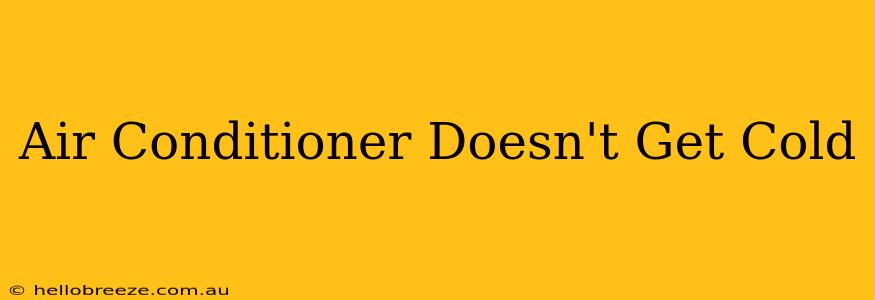Is your air conditioner blowing warm air instead of the cool relief you need? A malfunctioning AC unit can be incredibly frustrating, especially during a heatwave. This guide will walk you through common reasons why your AC isn't getting cold and how to troubleshoot the problem. We'll cover everything from simple fixes you can do yourself to when it's time to call a professional.
Why Your Air Conditioner Isn't Cooling Properly
Several factors can contribute to your AC unit failing to produce cold air. Let's explore some of the most frequent culprits:
1. Dirty Air Filter: The Most Common Culprit
A clogged air filter restricts airflow, preventing your AC from efficiently cooling your space. A dirty filter is the number one reason why AC units underperform. It's the easiest fix, so always check this first!
- Solution: Replace or clean your air filter. Consult your AC unit's manual for specific instructions on filter replacement or cleaning. Generally, filters should be checked and cleaned or replaced at least monthly, especially during peak usage seasons.
2. Refrigerant Leaks: A Serious Issue
Refrigerant is the chemical compound that absorbs heat from your home and expels it outside. A leak in the refrigerant system will severely impact your AC's cooling ability. This is a more complex issue requiring professional attention.
- Signs of a Refrigerant Leak: Low cooling capacity, frozen evaporator coil, hissing sounds from the unit.
- Solution: Call a qualified HVAC technician. They have the tools and expertise to detect and repair refrigerant leaks safely and efficiently. Never attempt to handle refrigerant yourself – it's dangerous.
3. Frozen Evaporator Coil: Restricting Airflow
A frozen evaporator coil is often caused by a dirty air filter, restricted airflow, or low refrigerant. The ice buildup prevents proper heat exchange.
- Solution: Turn off your AC unit and allow the ice to melt completely. Then, address the underlying cause (dirty filter, restricted airflow, or refrigerant leak) as discussed above.
4. Faulty Capacitor: Powering the Compressor
The capacitor is an electrical component that helps start and run the compressor. A bad capacitor will prevent the compressor from functioning correctly.
- Signs of a Bad Capacitor: The compressor doesn't start, the AC unit hums but doesn't cool.
- Solution: This usually requires professional repair. Replacing a capacitor involves working with electricity, so it's best left to a trained technician.
5. Problems with the Condenser Unit (Outdoor Unit)
The condenser unit, located outside, is responsible for releasing the absorbed heat. Obstructions, like debris or overgrown plants, can severely restrict airflow. Additionally, the condenser fan motor might be malfunctioning.
- Solution: Clear away any debris or vegetation around the condenser unit. If the fan isn't running, you'll likely need professional assistance.
6. Electrical Issues: Check the Breakers and Wiring
Ensure your AC unit is properly wired and that the breaker hasn't tripped. A tripped breaker is a simple fix, but underlying electrical problems might need a qualified electrician's attention.
- Solution: Check your circuit breaker box for a tripped breaker related to your AC unit. Reset it. If the problem persists, call an electrician.
When to Call a Professional
While some issues can be tackled independently, others require the expertise of a qualified HVAC technician. Always call a professional if:
- You suspect a refrigerant leak.
- You have a frozen evaporator coil that you can't fix.
- You notice unusual noises or smells coming from the unit.
- The problem persists after checking the obvious issues.
By understanding the potential causes and employing this troubleshooting guide, you can take the first steps towards restoring your home's cool comfort. Remember, prevention is key: regular maintenance, including air filter changes, will minimize the risk of encountering these issues and ensure your AC unit runs efficiently for years to come.

